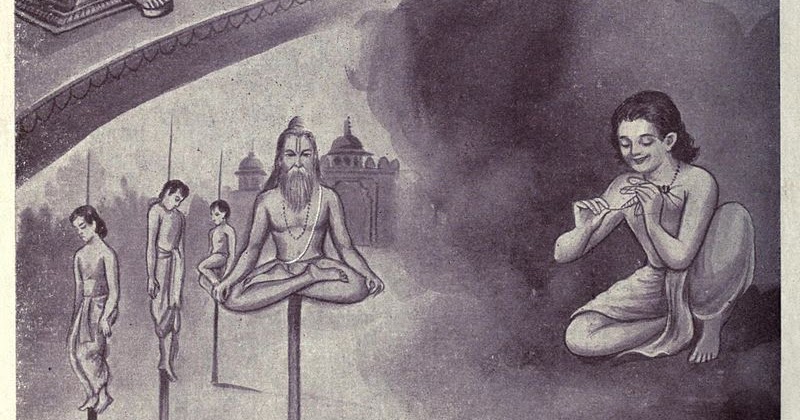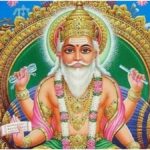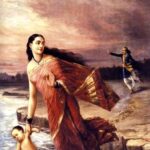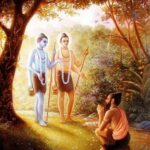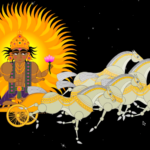Mandavya was a sage who lived in a hermitage in the woods on the edges of the city (City name not known). Sage Mandavya spent many days and nights doing penance and ascetic practices, living an austere life to acquire complete control of the mind and know its true prowess. Even though sage Mandavya was known for his simple, non-indulgent, self-disciplined impartial nature, he got widely recognized as the sage who got wrongly convicted and punished by the king of the state and his officers who then came to be known as ‘Ani-Mandavya’ (Mandavya with a stake within).
Once while sage Mandavya was in deep meditation a flock of robbers fled through the forest with the officers of the king in pursuit. The fleeting robbers needed a place to hide themselves and their pillaged bounty. Seeing the hermitage of sage Mandavya the fugitives takes hiding in the hermitage and also hides their bounty in a corner while the sage being in deep silent meditation. The officer in chief of the pursuit comes at the hermitage and questions the sage: “Did you see a group of thieves pass by ?” The sage could hear nothing and remains silent as being sunk into deep trenches of meditation. All outside worldly happenings had no effect on sage Mandavya’s meditation. The officer then repeats the question but in an imperious tone but still, the sage could hear nothing. In the meantime, the attendants of the officer would enter the hermitage without permission and finds the bounty hidden in a corner and also the fleeing thieves. The attendants report the same to the chief officer and arrests the fugitives. The chief officer constructs a wrong notion about the sage to be the head of the thieves and hence the reason for him being silent. He then orders his attendants to guard the place and goes to the king to give the news of finding the robbers and the self-made prejudice of a sage being involved in the robbery. The king after hearing the details from the chief officer becomes angry and offended knowing the insolence and impudence of the head of the thieves to be disguised as a brahmin sage and without any respite or verifying the facts or knowing the other half of the story orders the entire flock of robbers including the sage to be impaled.
The chief officer returns to the hermitage impales sage Mandavya on a spear (trident as per some books) along with all the thieves. The thieves died instantly but the virtuous sage though impaled remained alive due to his mental strength achieved through severe ascetic penances. Using powers of meditation sage Mandavya summons other rishis who come at the scene as birds and animals. All sages arrived at the hermitage would ask Mandavya the same questions, “How did this happen? “, “Who impaled you ?”, “What sin have you done to deserve such ruthless retribution ?” Mandavya replies “Who else can I blame this for other than myself? The servants of the king came in hot pursuit after a band of thieves. While I was in deep silent contemplation those thieves took hiding in my ashrama and also hid the stolen goods. Later the officers in pursuit came in, searched my ashrama, discovered the bounty, and arrested the hiding thieves. But also the chief officer thought of me being a part of the robbery and the head of the robbers and thus inflicted this punishment upon me.” Hearing this story, all arrived sages gets angry and starts demanding justice for sage Mandavya.
The king when through his servants comes to know about sage Mandavya and his superhuman powers and realizing the mistakes he had made, immediately orders his attendants to be taken to sage Mandavya’s hermitage. After reaching the hermitage, then being surrounded with hundreds of angry sages orders his attendants to take down the sage from the spear (or trident) and remove the stake out of his body. After trying hard it becomes evident that it won’t be possible to remove the entire stake out of the body of the sage, so then the king orders to cut the outer part of the stake, while keeping some part of the stake (tip of the stake) inside the body of sage Mandavya. The king then pleads and implores for forgiveness, being on his knees for the great mistake he had done unwittingly. Sage Mandavya forgives the king, as he thinks, the king was just trying to protect his kingdom and set an example for the rest about an impartial justice system.
For the rest of his life sage, Mandavya lives with a small piece of a stake inside his body doing great penance. Thus he comes to be known as ‘Ani-Mandavya'(Mandavya with a stake within). With time as the virtuous sage grew older and at the twilight of his life one day, he decides to visit Yamlok and see the God of Dharma. After visiting Dharma’s abode Mandavya enquires about the sin he had committed for which he was made to suffer such deprivation. He asks Dharma, “On what karma of mine did I deserve such great torture ?” Lord Dharma replies “Long back you did something similar as you impaled an insect on a blade of grass.” To this Mandavya asks, “At what age did I commit this sin ?” Dharma replies “You were a child when you did that act.” Mandavya then retorts saying, “As per scriptures the acts of a child done willingly or unwillingly till the age of 12 cannot be considered sinful and so you have acted wrongly and bestowed upon me sufferings as penance, superfluous to the sin I have done unwittingly as a child, for this, I curse you to be born as a mortal to a servant maid in your next birth, also from this day I raise the limit of sinless age to 14.” Thus Lord Dharma in his next birth was born as Vidura (brother of Dhritarashtra and Pandu) to a servant maid of queen Ambalika. Vidura born as an incarnation of Lord Dharma was unmatched in the knowledge of dharma, sastras, and statesmanship. Also as per sage Vyasa(Vidura’s father), Vidura was an embodiment of self-righteousness. knowledge and virtue. Throughout life, he stayed aloof of any worldly attachments and lived a life more like a mystic. At an early age, he was made the chief counselor of the blind king Dhritarashtra by the great Bhishma himself. Later Vidura was told of his true self by sage Maitreya (popularly known as Maitreya Maharshi) that he was no other than Lord Dharma who is born as a mortal as being cursed by sage Mandavya in the previous life.
